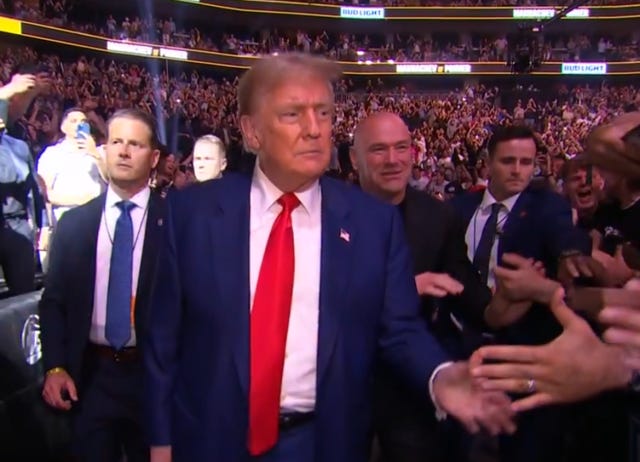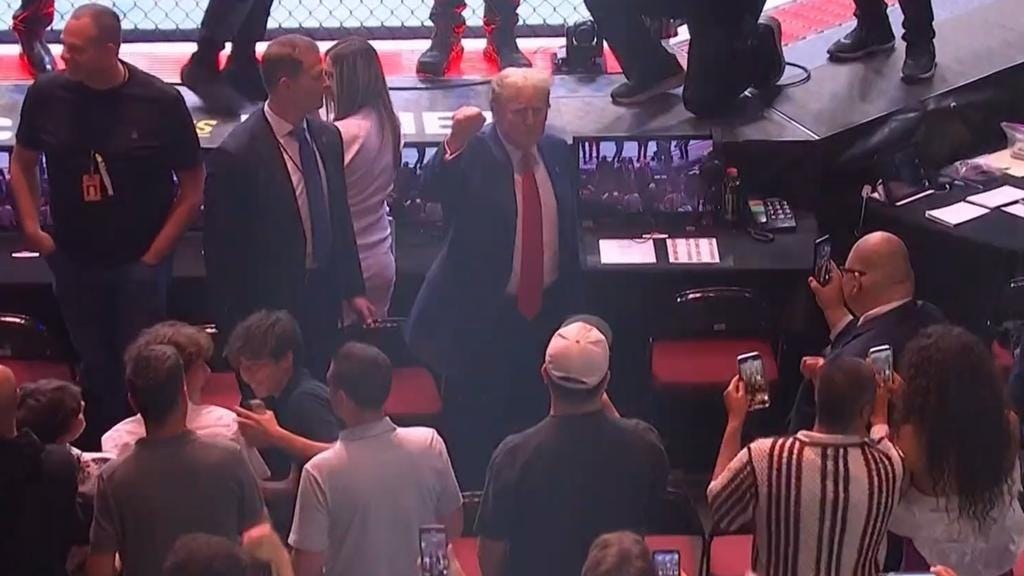American authoritarianism, sponsored by the UFC
Trump, the authoritarian darling of the right, is inching closer to the US presidency, again, with the UFC and its conservative fanbase acting as his loyal foot soldiers.
Welcome to Sports Politika, a media platform focused on the intersection of sports, power and politics. This outlet was founded by investigative journalist and researcher Karim Zidan and relies on the support of readers like you.
Help support independent journalism by becoming a paid subscriber today.
Two days after being found guilty on all 34 felony counts of falsifying business records in his New York criminal “hush money” trial, Donald Trump received a hero’s welcome at UFC 302 on Saturday night in New Jersey, where the former president made his first public appearance since becoming a convicted felon.
As Trump was escorted to his cageside seat by UFC President Dana White, he received a standing ovation and raucous applause from the packed arena. The former president shook hands with spectators and posed for photos as he made his way to his seat, all while fans chanted “Fuck Joe Biden” and “We want Trump.”
Trump, whose sentencing hearing takes place on July 11 — four days before the Republican National Convention, when the party will officially nominate him for President—was also pictured backstage meeting with several prominent UFC fighters, including Brazilian light heavyweight champ Alex Pereira and the organization’s resident bigot Sean Strickland.
Having made history as the first US president to become a convicted felon, it was unsurprising that Trump was eager to appear before a friendly audience instead of at an official campaign rally. The UFC’s established role as a platform for Trump’s ideology, along with its right-wing fanbase that significantly overlaps with Trump's supporters, made the organization an ideal venue for the former president.
Trump’s frequent appearances at UFC events—where he is lauded by celebrities and adoring crowds—helps normalize a man who is comically corrupt, infamously racist, a known sexual abuser, and a key figure who incited an insurrection at the US Capitol after losing the 2020 presidential election.
Yet beyond the UFC’s willingness to host Trump at their events, the organization has openly become a platform for promoting Trump’s extremism, including his creeping authoritarianism.
Last month, The New York Times published a detailed visual investigation detailing Trump’s “pattern of sowing election doubt,” which has intensified significantly ahead of the 2024 election. According to the analysis, Trump has cast doubt about the fairness of the 2024 election about once a day, on average, since he announced his candidacy for president.
“This is a rigged deal, just as the 2020 election was rigged, and we can’t let them get away with it,” Mr. Trump said on Nov. 18, 2022, three days after announcing his 2024 candidacy.
While Trump’s claims of “rigged” elections is nothing new, what is particularly alarming is just how much it has become a part of his overall campaign strategy, having mentioned it at least 350 times since announcing his candidacy. Trump has also alluded that would not accept the result of the election if he loses—a no-lose strategy that ensures he either wins the election, or that the results are rigged if he loses.
Beyond sowing doubt in the upcoming US election, Trump has also made a wide range of authoritarian statements on the campaign trail, including threats to round undocumented immigrants and place them in mass deportation camps. The former president and his allies are also reportedly looking into ways to use the federal government to target and punish their political opponents and critics. This would include assigning a special prosecutor to target Trump’s enemies, including Biden, as well as invoking the Civil War era Insurrection Act — a law that gives the president nearly unchecked powers to use the military as a domestic police force — so that he could quash any public protests against him.
Trump’s allies even urged him to invoke the Insurrection Act to stay in power after losing the 2020 presidential election.
Despite these concerning reports of Trump’s gleeful attempts to dismantle democracy in the US, the recently convicted felon remains in a tightly-contested race against Biden, who has been losing support in key demographics for various reasons, not least of which include his handling of Israel’s war on Gaza.
It is worth noting that Trump’s position on Israel-Palestine is hardly better than Biden’s. Despite telling former UFC champ Khabib Nurmagomedov at UFC 302 that he would “stop” the war, there is little evidence to suggest Trump would do any such thing. Just last week, Trump told wealthy donors that he would “set [the pro-Palestine] movement back 25 or 30 years,” referring to the anti-war demonstrations as a “radical revolution.” He also praised New York police who violently cleared the student encampments at Columbia University.
Trump has also been boasting about his Middle East policies during his presidency, namely the decision to move the US embassy from Tel Aviv to Jerusalem and the recognition of the Israeli annexation of the Golan Heights, which Israel occupied from Syria in the 1967 six-day war.
Given Trump’s stated authoritarian goals should he win the upcoming election, why is the UFC—a US-based sports organization owned by Hollywood’s most powerful Hollywood agent, Ari Emanuel—helping legitimize his campaign, effectively becoming an extension of Trump’s propaganda?
Though Trump has enjoyed the support of UFC fighters and executives since his initial presidential campaign in 2016—around the same time that Emanuel, Trump’s former agent, purchased the organization—his history with the UFC dates back to 2001, when Zuffa LLC, an American sports promotion company founded by Las Vegas casino tycoons Lorenzo and Frank Fertitta, first purchased the UFC.
At the time, the UFC was an ostracized company relegated to small venues in states like Mississippi and Alabama. The late Sen. John McCain referred to MMA as “human cockfighting,” a comment that had tarnished the UFC’s reputation and its ability to promote events across the country. Thirty-six states enacted laws banning “no holds barred” fighting, while the large cable pay-per-view platforms refused to air UFC events. But Trump took a chance on the UFC and allowed the promotion to put on two consecutive events in 2001 at his Atlantic City casino.
These events are now the stuff of UFC marketing lore and went a long way in helping the UFC gain a foothold in various other states. Soon, the UFC started hosting large-scale events in its home base of Las Vegas and when the UFC finally returned to Atlantic City in 2005, White credited Trump as the businessman who gave the UFC its “first shot.”
Since then, White has enthusiastically promoted Trump and his politics from his perch atop the UFC. He defended the president’s controversial policies, including the wall on the United States’ southern border, during UFC programming. He visited Trump at the White House in 2018 with former interim welterweight champion and rightwing media personality Colby Covington, where they posed for pictures in the Oval Office.
The UFC even produced a documentary showcasing the league’s history with Trump and his role in promoting mixed-martial arts on a national stage. The short film—titled Combatant in Chief—was a shameless example of how freely the UFC has exploited its infrastructure to urge its audience to embrace one of the most controversial presidents in US history—a case study in how sports organizations can moonlight as platforms for political propaganda.
White continued to deploy the various arms of his billion-dollar empire when it came time to support Trump’s re-election bid in 2020. The UFC president spoke at the 2020 Republican National Convention – his second time speaking at the event – as well as at several rallies along the campaign trail. During his bombastic appearances, White expressed many of the Trump campaign’s talking points.
“President Trump built the greatest economy in our nation’s history and created opportunities for all Americans like no one before him,” White, who also donated $1 million to pro-Trump super PAC America First Action, said during a pre-taped speech in August 2020. “Financial markets hit all time highs; unemployment hit all-time lows, and we weren’t facing the lawless destruction that now is occurring in a few of our great cities.”
Though not yet confirmed, it is more than likely that White will continue this tradition and speak at the upcoming RNC in July.
Furthermore, several of the UFC’s biggest names also took part in Trump’s campaign events over the years. Retired UFC fighter Jorge Masvidal headlined a “Fighters Against Socialism” tour across Florida alongside Donald Trump Jr. while former UFC interim welterweight champion Colby Covington hosted a “MAGA boat parade” in Miami alongside Eric Trump. Former UFC champion Henry Cejudo spoke at a Latinos for Trump event in September 2020.
Then, in the wake of Trump’s electoral defeat in 2020, several of the same fighters took to social media to spread misinformation about alleged voter fraud. One former Ultimate Fighter competitor even proclaimed that a “civil war is coming.”
Why are so many MMA fighters turning to right-wing politics?
In the U.S. and around the world, MMA's embrace of outsider sports fans and right-wing politicians has helped create a wave of athlete…
Despite facing his second impeachment after the Jan. 6 insurrection and a series of criminal charges and convictions, the UFC has consistently maintained its unwavering support for the former president. This steadfast loyalty largely stems from the fact that many of the organization’s executives and its most prominent fighters are enthusiastic Trump supporters. The UFC’s core fanbase, which includes young apolitical men and conservatives, shares this support.
Meanwhile, the UFC has significantly benefited from its association with Trump. The organization has cultivated a following among conservative media personalities, pundits, and influencers, positioning itself as a stronghold against so-called liberal woke culture. This strategy has helped the UFC expand its conservative fanbase and strengthen its brand, while leading executives like Dana White have gained substantial political influence beyond the Octagon.
While many fans may believe this won't impact their daily lives, take it from someone who grew up under various military dictatorships and authoritarian regimes: sports may offer an escape, but that won't stop authoritarians like Trump from exploiting them for personal gain—gain that inevitably comes at the expense of people like us.
Sports Politika is a newsletter about the intersection of sports, power and politics. If you like what you see, upgrade to a paid subscription ( or gift a subscription if you already have your own). We would appreciate if you could also like the post and let us know what you think in the comment section below.






